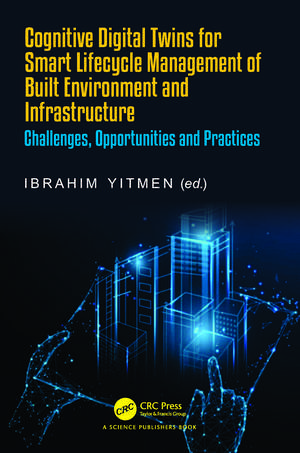Cognitive Digital Twins for Smart Lifecycle Management of Built Environment and Infrastructure: Challenges, Opportunities and Practices
Editat de Ibrahim Yitmenen Limba Engleză Paperback – 29 noi 2024
| Toate formatele și edițiile | Preț | Express |
|---|---|---|
| Paperback (1) | 363.41 lei 6-8 săpt. | |
| CRC Press – 29 noi 2024 | 363.41 lei 6-8 săpt. | |
| Hardback (1) | 1054.99 lei 6-8 săpt. | |
| CRC Press – 17 iul 2023 | 1054.99 lei 6-8 săpt. |
Preț: 363.41 lei
Preț vechi: 454.25 lei
-20% Nou
Puncte Express: 545
Preț estimativ în valută:
69.55€ • 72.06$ • 58.04£
69.55€ • 72.06$ • 58.04£
Carte tipărită la comandă
Livrare economică 21 martie-04 aprilie
Preluare comenzi: 021 569.72.76
Specificații
ISBN-13: 9781032136288
ISBN-10: 1032136286
Pagini: 240
Ilustrații: 152
Dimensiuni: 156 x 234 mm
Greutate: 0.44 kg
Ediția:1
Editura: CRC Press
Colecția CRC Press
ISBN-10: 1032136286
Pagini: 240
Ilustrații: 152
Dimensiuni: 156 x 234 mm
Greutate: 0.44 kg
Ediția:1
Editura: CRC Press
Colecția CRC Press
Public țintă
AcademicCuprins
Preface. Introduction. Enabling Technologies for Cognitive Digital Twins towards Construction 4.0. Synopsis of Construction 4.0-based Digital Twins to Cognitive Digital Twins. Integration of Digital Twins, Blockchain and AI in Metaverse: Enabling Technologies and Challenges. AI-Driven Digital Twins for Predictive Operation and Maintenance in Building Facilities. Knowledge graph-based approach for adopting Cognitive Digital Twins in Shop-floor of Modular Production. Improving sustainability in the built environment through the integration of Digital Twins and Blockchain: an analysis of prefabricated modular construction. Digital ID Framework for Human-Centric Smart Management of the Indoor Environment. Semi-Autonomous Digital Twins to Support Sustainable Outcomes in Construction 4.0. Index.
Notă biografică
Ibrahim Yitmen received his PhD in Architecture from Istanbul Technical University, Turkey. Since February 2018 he has been an Associate Professor in Management of Construction Production at Jönköping University, Sweden. His research focus is mainly on Innovation in Construction involving socio-technical issues regarding digital transformation in AEC industry, and his recent special interest is on Digital Twin-based Smart Built Environment, Augmented Reality/Mixed Reality for Cognitive Buildings, Integration of Digital Twins and Deep Learning for Smart Planning and Construction, Blockchain Technology in Construction Supply Chains, Cyber Physical Systems for Construction 4.0, Integration of Unmanned Aerial Vehicles and BIM for Construction Safety Planning and Monitoring. Dr. Yitmen have published more than 100 research papers in refereed international journals and in peer reviewed conference proceedings. He has recently been the editor of the book titled "BIM-enabled Cognitive Computing for Smart Built Environment: Potential, Requirements, and Implementation" published by CRC Press. He was one of the guest editors of the MDPI Journal Applied Sciences for the Special Issue "Cognitive Buildings". Dr. Yitmen is currently leading research projects titled "Integration of Blockchain and Digital Twins for Smart Asset Lifeycle Management" financed by Smart Built Environment (Sweden), titled "Adapting Cognitive Digital Twins for the Production of Sustainable Modular Houses" financed by Vinnova (Sweden), and titled "Collaborative Digital Platform for Dynamic Workflows in Construction Production and Information Exchange Planning financed by Jönköpings Läns Byggmästareförening". Dr. Yitmen serves on the scientific committees of the international conferences held by the International Council for Research and Innovation in Building and Construction (CIB), American Society of Civil Engineers (ASCE), and European Council on Computing in Construction (EC3). He is an active Member of American Society for Engineering Management, USA since 2010.
Descriere
This book explicitly brings together Cognitive Digital Twins for smart lifecycle management of built environment and infrastructure and focuses on the challenges and opportunities of data-driven cognitive systems by integrating the heterogeneous data from multiple resources.
